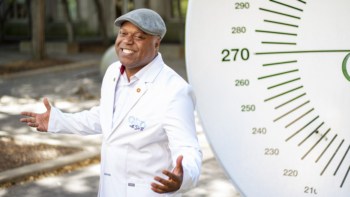Researchers around the world have just submitted the first proposals for funding from the European Research Council. Martin Griffiths looks at what exactly the new council offers and how you go about getting your hands on the cash

Anyone who has tried to apply to the European Union for money for science will know what is involved: big collaborations, a focus on applied research and lots of bureaucracy. But that is all set to change with the arrival of the European Research Council (ERC), which was launched with great fanfare in Berlin in February at a meeting attended by 300 scientists plus German Chancellor (and former physicist) Angela Merkel.
The ERC, which has a total budget of €7.5bn for the next seven years, is designed to support fundamental research in all fields of science and technology, including social sciences and the humanities. With large grants going directly from the European Union (EU) to individual researchers for the first time, the new research council is being billed as the European equivalent of the National Science Foundation in the US. The ERC aims to help research in Europe compete with that in the US and Japan by introducing pan-European competition for grants and boosting investment in research and development. Currently, Europe spends only 1.9% of its Gross Domestic Product on R&D, compared with 2.7% in the US and 3.2% in Japan, but the EU wants Europe’s total investment to rise to 3% by 2010.
Scientists have long dreamed of a pan- European research council but a political head of steam only began to build in 2002. It has taken five years to hammer out the details of how the ERC will be funded and governed, and how its money will be allocated. The funding for the ERC will come from the EU’s €53bn Seventh Framework Programme; but unlike previous framework programmes, the ERC will emphasize fundamental over applied research and individuals over large collaborations. Furthermore, decisions about what to fund will be made by scientists, not bureaucrats. The ERC’s strategy is set by a council of 22 scientists headed by biologist Fotis Kafatos from Imperial College London together with Daniel Esteve, a physicist working on quantum electronics at CEA Saclay in France as a vice-chair.
Starting out
There will be two types of ERC grants: “starting grants” are aimed at researchers who completed their PhD between 2 and 9 years ago (or up to a maximum of 12 years for women who have taken a career break); while advanced grants are intended for more established researchers. The starting independent researcher grant, to give it its full name, is the first to get under way, with the deadline for the first set of research proposals at the end of April having just passed. But do not worry if you feel that you have missed the boat this time: there will be another call for starting-grant proposals next year.
The starting grant is intended to support researchers who are planning to set up or are already leading their first research team. A key theme is independence – the ERC wants to allow outstanding researchers to take decisions about the direction of their team’s research and their budget independent from their university. This significantly extends the idea of the European Young Investigator (EURYI) awards, which the European Science Foundation has offered since 2003. These grants are worth about €1m over five years, but only 20 or so researchers each year are able to benefit from them.
Funding from the ERC is available to researchers from anywhere in the world, as long as they plan to work within an EU institution. The ERC thus hopes to attract the best new talent from around the globe, as well as tempting back some of the many European researchers who have moved elsewhere.
Rewarding excellence
In the first call for proposals about 200 grants are available with funding per grant of €100,000– €400,000 per year for five years. There is a two-stage application process: first an outline proposal is submitted; then, for the successful applicants, a full proposal and an interview are required. Applications must be submitted online, in English, by a single principal investigator in association with a host institution. Several thousand applications are expected from the first call, which will be whittled down to those from about 500 researchers who will be asked for their more detailed proposal by September.
Each proposal will be evaluated by one of 20 panels of about a dozen experts in fields ranging from genetics to economics. An encouraging sign for the fledgling ERC is that 95% of the scientists asked to join these panels accepted the invitation. Physicists are most likely to send their proposals to one of three specialist panels: “fundamental constituents of matter” (chaired by Massimo Inguscio of the European Laboratory for Non-Linear Spectroscopy in Florence, Italy); “condensed matter in physics and chemistry” (headed by Robert Blinc of the Jozef Stefan Institute in Slovenia); and “universe science” (led by Catherine Cesarsky, director-general of the European Southern Observatory).
The ERC insists that the sole criterion for selection is scientific excellence, both of the principal investigator and the proposed project. This will mean abandoning the long-established principle of juste retour, whereby EU member states receive an amount of funding proportional to how much money they put in. Specific points for assessment listed by the ERC are the quality of the principal investigator’s research output (based on their five most important papers), the groundbreaking nature of the project being proposed and the potential for the principal investigator to become independent. Physical sciences will get 45% of the money, life sciences 40% and social sciences and the humanities 15%, but within these broad categories, proposals from different fields will have to fight it out based on scientific merit.
Champions League
As the deadline for the second stage of the starting-grant applications arrives in the autumn, the first call for proposals for advanced grants will be issued. Full details have not yet been released, but there will be about 300 grants, each of €100,000 to €500,000 per year for five years. Although these grants are targeted at researchers who have already established themselves as independent, world-class leaders, scientists at any stage of their career may apply. From 2008 there will be annual calls for both starting and advanced grants with about a third of the money going to the former, and the rest to the latter.
As well as providing scientists with hefty sums of money, the awards are sure to confer a good deal of prestige. After all, successful researchers will have won out against thousands of others across the continent. These are still early days for the ERC, but it may soon become, in the words of Merkel herself, “a Champions League for research” where the cream of Europe’s scientific talent can compete for big money.



